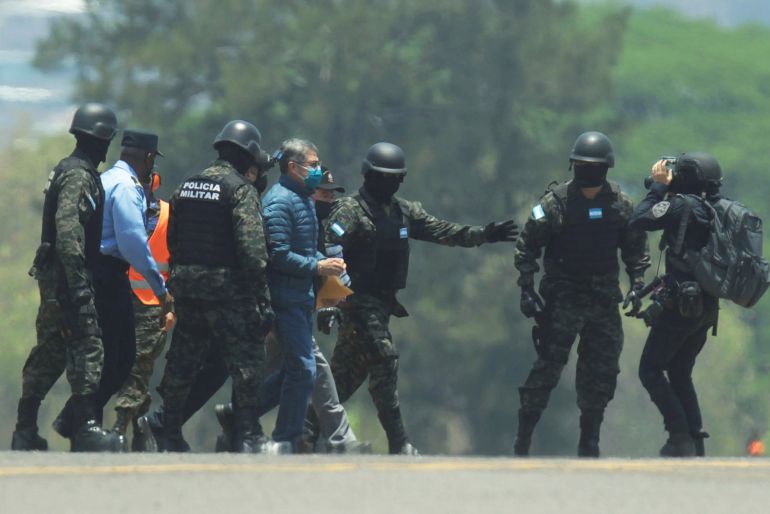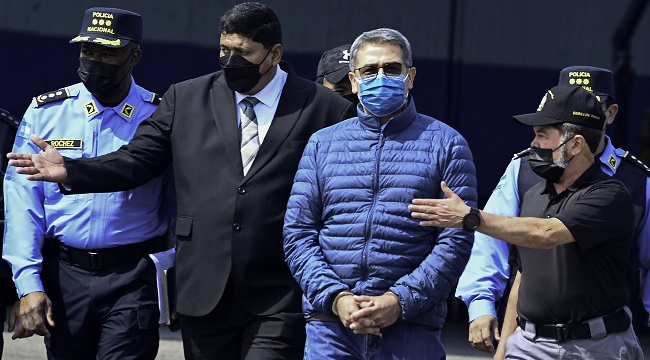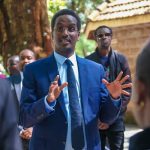Bundled against the cold gusts of a New York winter, Cecilio Alfaro braved the morning rush to arrive at Manhattan’s Financial District just after sunrise at 7am on Tuesday.
A longtime United States resident, formerly from Honduras, Alfaro wore a beanie hat patterned with the colours of the American flag. He was dressed for a once-in-a-lifetime trial, overseen by federal prosecutors.
The defendant in question was none other than former Honduran President Juan Orlando Hernández, who — after styling himself as a tough-on-crime conservative — now faces drugs and weapons charges.
Prosecutors accuse him of running a “corrupt and violent drug-trafficking conspiracy” while in office, in which he accepted millions of dollars in exchange for facilitating cocaine shipments to the US.
The trial has captured public attention within Honduras and its diaspora, with observers like Alfaro seeing the hearings as a referendum on Hernández’s two terms as president.
“There’s so much evidence against” Hernández, Alfaro told Al Jazeera after making it past the tight security inside the Southern District Court of New York.
Climbing twenty-three stories, Alfaro joined dozens of journalists and curious citizens who packed the courthouse, glued to a closed-circuit video of the proceedings.
“The people suffered so much in Honduras,” Alfaro said. “There’s going to be justice, divine justice.”
Hernandez’s divisive legacy
The trial is one of the most consequential in years for Hondurans, as it weighs the legacy of one of the country’s most divisive figures in recent history.
“The great majority” of Hondurans, radio journalist Pablo Zapata told Al Jazeera, “are really on the edge of their seats with this case”.
Commonly known by his initials JOH, Hernández came to power in 2014, campaigning on the promise of “una vida mejor” — a better life — for everyday Hondurans.
“Honduras is going through one of the most difficult periods when it comes to security,” Hernández said in his inauguration speech. At the time, the country faced high rates of crimes linked to drug trafficking.
Hernández pledged to address the problem through “mano dura” — or “iron fist” — policies. That included the deployment of military forces to the streets. “The party is over for criminals,” he announced.
But it did not take long for accusations of corruption and human rights abuses to pile up against Hernández’s administration.
Early in his tenure, in 2015, Hernández faced allegations he had siphoned money from Honduras’s Social Security Institute. Critics later blamed him for failing to protect public figures like environmental activist Berta Cáceres, who was assassinated in 2016.
His reelection in 2017 was likewise tarnished by suspicions of electoral fraud.
In court this week, US prosecutors described Hernández as a leader who used his position for personal gain, transforming Honduras into a “narco-state”. In one case, they allege he collected approximately $1 million from the Mexican drug lord Joaquín “El Chapo” Guzmán in exchange for protecting the Sinaloa cartel.
Hernández has pleaded not guilty, and his lawyers argued this week that he, in fact, stood up to drug trafficking.
On Wednesday, defense attorney Renato Stabile used his opening statement to tell the jury that many of the expected witnesses — former drug traffickers who claim to have been protected by Hernández — cannot be trusted because of their violent pasts, insinuating they had exaggerated or lied in exchange for reduced sentences.
“You’re going to hear from a lot of devils,” Stabile said.
Critics questions former US support
Meanwhile, the US Justice Department, under President Joe Biden, has taken a strong stance against Hernández, officially labelling him a “corrupt and undemocratic actor”.
In February 2022, just weeks after he left office, Hernández was arrested at his home in the Honduran capital Tegucigalpa. Two months later, the former president was extradited to the US to face charges.
His fall from grace came after the US government pursued his younger brother Juan Antonio “Tony” Hernández, a congressional deputy.
In 2018, Tony was arrested in Miami for trafficking 185 tonnes of cocaine as well as firearms. Three years later, in 2021, a US court sentenced him to life in prison, the culmination of a trial that had also implicated the Honduran president.
But some critics, including Canadian human rights activist Karen Spring, see Hernández’s trial as a chance to demand accountability from the US as well. They accuse the US of complicity in the circumstances that led to Hernández’s presidency.
The US has an extensive, and controversial, history of involvement in Honduras — from its early 20th-century grip on the country’s fruit industry to its use of Honduras as base of operations during the Cold War.
In 2009, Honduras experienced a military coup d’état that resulted in Hernández’s conservative National Party taking back power. The US briefly suspended aid to Honduras in the aftermath — but that measure proved to be short-lived.
By the time Hernández was in office, the US saw Hernández as a key ally in expanding its “drug war” and stemming against northbound migration. Under presidents Barack Obama and Donald Trump, the US sent Honduras millions of dollars in military and security assistance.
All the while, Spring told Al Jazeera, Hernández was allegedly using military and police forces to protect drug traffickers.
She is part of “Putting the US and Canada On Trial”, a campaign scheduled to coincide with Hernández’s court case that seeks accountability for crimes committed in Honduras.
“The US and Canadian governments ignored warning signs that JOH was involved in organised crime for years,” Spring said.
“Instead, both countries continued to politically support JOH, describing him as a drug war ally, all while he trafficked narcotics using Honduran state security forces under his command.”

Problems persist into the present
Other activists and journalists see Hernández’s trial as a mirror for ongoing struggles within the Central American country.
José Luis Guillén, a TV journalist for TeleCeiba and Radio America, said the trial has generated intense scrutiny across all sectors of society, with high-profile witnesses expected to be called.
“It’s being talked about everywhere [in Honduras], not just in the government,” Guillén said of the trial. “Because it could implicate TV channels, business interests, gangs. It’s a daily conversation.”
Some critics have already singled out the Honduran news media’s role in the scandal.
Cristián Sánchez, a independent journalist living in Washington, DC, helps run the Pro-Honduras Network, a civil society organisation specialising in exposing corruption.
He said that, while the widespread press coverage of Hernández’s trial is welcome, it comes after years of silence from media outlets that failed to cover Hernández’s excesses. Some, he believes, may have been bought off.
“For years, it was prohibited to talk about Hernández in Honduras — above all, on corporate channels,” Sánchez said. “Juan Orlando financed many of these journalists to the tune of millions of dollars so they wouldn’t talk about him.”
Sánchez was quick to add, however, that the violence and human rights abuses that existed under Hernández persist into the present, despite Honduras having a new, left-leaning administration in power.
For his part, land rights activist Yoni Rivas sees Hernández as merely the severed head of criminal structures that continue to operate in Honduras today.
Those networks “include bankers, politicians, and businessmen”, he told Al Jazeera in Tocoa, part of a region in Honduras where at least a dozen land and water defenders have been assassinated or forcibly disappeared over the past year.
Still, Rivas thinks Hernández’s trial will shine a light on the disgraced president’s legacy.
“The level of impunity that Juan Orlando generated, and the power he achieved through his allies, continue creating conditions of violence in Honduras. We’re still going to keep suffering violence here.”



